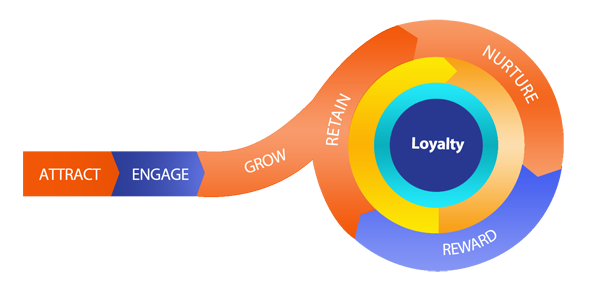Customer relationships. How important are they? Very. The simple fact is that keeping your existing customers is far easier – and cheaper – than finding new ones.
In fact, studies from the U.S. Small Business Administration and U.S. Chamber of Commerce found acquiring new customers can cost five to seven times more than simply retaining existing ones.
So how exactly do you build customer relationships that stand the test of time? Read on.
Be a partner, not a provider
Your customers want you to know all about them. And this is to your benefit. Learn what they do, what their struggles are (pain points), and what they hope to achieve.
Once you know all of this, you can actively give your clients strategic direction. Meet with the decision makers. Tell them how they can leverage your IT solutions for their business success.
This is how you move from being a provider (who just blindly throws technology their way) to a partner. The worst thing you can do is just wait around until they ask you to update their systems.
You can also research your customers on LinkedIn to get a bit more background information on their business, assuming they have an account.
Be active
There’s another reason you want to open up the communication channels. Research by Client Heartbeat show 96% of customers don’t complain when they’re unhappy, and 91% will just leave and never return.
In short, if you don’t regularly check the ‘relationship pulse’ of your best customers, you’re not going to know when they’re eyeing the door. One day, they’ll just be gone.
So contact them by phone, email, or social media and check in every so often. You can talk to them about compliance or regulations you might be able to help with (E.g. GDPR), or simply say you’re giving them a courtesy call. Don’t sit around just waiting for them to request an update of their systems.
This sort of regular contact can be tough, especially if you’re low on staff. It helps to supplement this with monthly emails to keep people up to date with what’s going on in your company. You can also forward through blog posts and videos you think might help them out.
Don’t wait until something burns down. Put in some preventative work, monitor the solutions you’ve put in place for them, and catch problems before they occur. This will prevent your customers experiencing breaks in productivity and help minimize their downtime. The less downtime they face, the more they’ll appreciate your services and solidify their reliance on you.
Be accessible
So we’ve talked about making contact with your customers. The flip side is you need to be there when they want to contact you.
While ideally you’d be accessible 24/7, this isn’t always something a business can manage. So if this isn’t possible, you need to focus on working with others (if you have peers) to distribute the workload. This way, someone is accessible most of the time.
You also need to be responsive to their queries. When the call or email comes in, hit the ground running. And after they’ve called, revisit the situation at a later date and see that they were well responded to.
And when you get complaints – it’s inevitable in any job – don’t get defensive. In fact, you need to thrive on feedback. It’s a rare chance for you to reach out and redeem yourself in the eyes of the customer.
Don’t be a robot
Besides the obvious ‘don’t actually use an automated robot’, when you’re talking to a customer, you need to be a real person.
What this means is not memorizing greetings, apologies, and sales pitches. You need to let them speak to you. Use their names. Be polite but conversational. And if it’s appropriate, you can make a joke.
Basically, you need to show that you care about their problems and you’re actively speaking with them, instead of just being a passive listener who is going off a check-list.
Through multiple interactions, you’ll be able to build up a relationship with your customers. You might even remember certain things about them and their business when they ring.
All of this helps foster customer loyalty. It’s not rocket science; people like people who care about them and their problems.
Establish and maintain value

Loyalty is important. When a customer is loyal, they will turn down other products that offer a better price just to do business with you. That’s because they value working with you more than the money saved.
To foster loyalty, you need to make a positive impression on your customers with a series of interactions, both small and large. Added up, these give a greater overall experience that represents your band.
And you can’t slip up – customers remember negative experiences far more than positive ones. If you delivered on 20 occasions but under-delivered once, they will remember this, and use it as a reason to cancel a contract.
Unfortunately, once customers have experienced bad customer service, that relationship is usually broken and impossible to repair. That’s why it’s so important to maintain value!
… And if possible, exceed it.
Sure, you can keep exactly to your service agreement as expected. But going that bit further – perhaps in personalized service or additional support – breeds loyalty.
Offer things that aren’t part of your service for free. Do that extra overtime fixing their machine without charging for it. Basically supersede what is expected.
Clear pricing and expectations
Make sure your customers know exactly what they’re being charged, and for what. An easy to understand pricing model means the whole process runs smoother, and you want to be easy to do business with.
At the same time, make sure you’re on top of industry standards and shifting costs. And make it easy for your customers to pay for service upgrades if they need extra coverage.
Get the right people involved
Sometimes, having the right people providing a service is more important than the solution you provide – and even if your solution is amazing, you still want the right people involved anyway.
Make sure that the right people are represented from your business and easily contactable. This means the person who deals with accounts, customer support, the decision maker, and the sales person.



